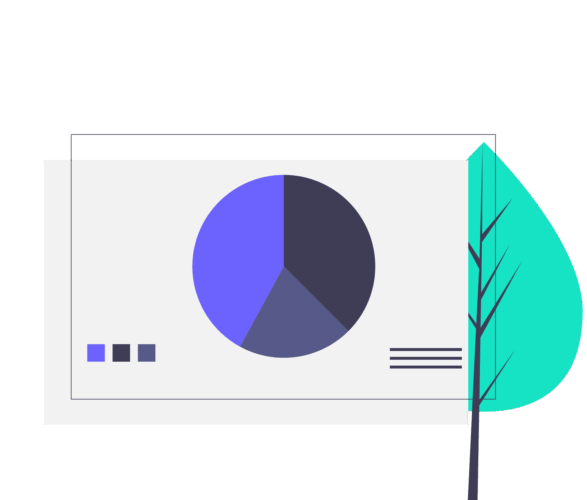Debt Consolidation
Discover how to consolidate your payments into a single monthly payment and keep your credit score intact.

What is a debt consolidation?
Debt consolidation is a loan that you request from your financial institution to combine (consolidate) all or part of your debts. The money from this loan is used to pay your existing creditors. Having only the consolidation loan allows you to have only one monthly payment for a maximum period of 5 years. The loan generally will cost between 12% and 15% interest per year, depending on the credit risk you represent. The good news is that the loan has no impact on your credit report. Check out all our articles on debt consolidation.
If the financial institution refuses to grant you such a loan or if the monthly payments are too much for your budget, a consumer proposal may prove to be a very interesting alternative.
Debt consolidation is a good choice for you if...
- You have a good credit history
- You are able to make the payments for a loan representing 100% of your debts plus an interest rate ranging between 12% and 15% (see our loan calculator tool).
- The majority of your debts have an interest rate higher than12%.

Why consolidate?
A consolidation loan aims to achieve 3 main objectives:
- Consolidate all your payments into a single monthly payment
By having only one monthly payment instead of separate payments for each of your debts, it will be easier for you to manage and less risk of being late on some or many payments. - Reduce interest costs
By consolidating debts that have a higher interest rate than the consolidation loan itself, you will save on interest costs. For example, a $10,000 balance on a credit card with a 20% interest rate will cost you $5,896 in interest over 5 years. In contrast, a consolidation loan will cost you only $3,346. That’s a significant difference. - Establish a repayment plan for your debts
Typically, repayment of a loan extends over 3 to 5 years. For example, if you only make the minimum payment (3%) on your $10,000 credit card balance, you will pay $12,100 in interest, plus the principal, over a period close to 22 years, for a total of $22,100. With a consolidation loan, the monthly payment will be higher because you’ll have a maximum of 5 years to repay it. However, in the end, you’ll have saved $8,755 in interest costs.

What are the advantages of debt consolidation?
- Repayment of 100% of your debts over 5 years.
- Only one payment per month, making it easier to manage.
- Lower interest rate (12%) compared to credit cards.
- Maintain your credit score.
What are the 3 eligibility criteria for obtaining a consolidation loan?
- Debt ratio (hypertext) below the range of 40%-42% (depending on the quality of the credit history).
- A good credit score (i.e. not too many late payments).
- Stable job.

Eligibility criteria for a consolidation loan:
- Debt level below 40%-42% (depending on credit history)
The 1st question the lending financial institution will ask is whether the requested loan will result in your debt level becoming too high compared to your financial capacity. Therefore, when calculating your debt ratio using our Debt Ratio tool, you need to consider the monthly payment of the desired consolidation loan, not the total monthly payments of the existing debts you wish to consolidate. To determine the monthly payment of the consolidation loan, use the Loan Calculator tool, enter the requested loan amount, an interest rate of 12%, and an amortization period (loan term) of 5 years. If your result is below 40%, congratulations, you meet the first criterion! - Good credit history
Your credit history is divided into two parts: the first deals with your repayment habits for each of your debtsfor the past 6 years, and the second is your credit score. The credit score takes into account 5 factors to establish your overall average. The score ranges from 300 to 900, and generally, a minimum score of 680 is required to be eligible for a loan. To learn more about this, feel free to consult our credit report section. - Financial capacity to repay
Although the debt ratio is a good indicator of your debt level and financial capacity, the financial institution will also want to ensure that your personal expenses (other than for housing and debts) leave you with enough money to repay the consolidation loan. It is therefore important to prepare a budget to verify that this is the case. Regarding this matter, our budgeting section offers several tips. - Stablejob and residence
A stable job and not moving every year will also work in your favor, as financial institutions like stability and predictability. However, they are also aware that in today’s job market, individuals with interesting professional profiles are sought after and more likely to change employers. If a change in your employment is aimed at improving your situation, this factor will not be held against you.
What to do if consolidation is not possible or is refused?
Start by asking your financial institution for the reasons for the refusal. Sometimes, it may be a simple error in your credit report that you can correct before submitting a new application. Regardless, it is essential to know the reasons for the refusal to determine if you can quickly address these difficulties and meet the necessary conditions.
If the refusal is due to factors you cannot change, you may consider other forms of consolidation such as a consumer proposal. The principle remains the same: consolidating all your payments into a single monthly payment, reducing interest costs, and planning repayment over a maximum of 5 years. You will then have the advantage of being able to make a settlement offer at a discount but be aware that your credit score may be affected.
In case of refusal of a consolidation loan or if you have any questions concerning your options, you might benefit to consult one of our personal finance advisor (licensed insolvency trustee) to explain, in complete confidentiality, the options available to you.
Important elements to consider
Many companies offer debt consolidations but be beware if it is not a chartered bank or Desjardins. Indeed, the interest rate could be much higher than 12% to 14%, and in this case, there will be no benefits of consolidating—i.e., reducing interest costs.
If your credit profile is not as strong as it should be, either because your debt level is too high, your credit history has gaps, or your financial capacity for repayment is uncertain, you may be asked for a guarantor. A guarantor is a person who will be responsible for your loan if you are unable to repay it. This is often a parent or a very close friend who trusts you enough to help you. If this is your case, beware.
Payment defaults rarely occur due to a lack of your willingness. Most of the time, they result from unforeseen circumstances such as job loss, separation, or illness. Therefore, think twice before involving a loved one in your financial endeavors. Consider that if the financial institution, which is an expert in finance, deems it necessary to require a guarantor, it means they might have doubts about your financial capacity… This should be a red flag for you.
Your questions
Is debt consolidation a good solution for me?
Debt consolidation involves requesting a loan from your financial institution to pay off the debts that would wish to consolidate. This loan allows you to regroup all your monthly payments in one single payment and, by consolidating the debts with a high interest rate, to reduce your interest costs.
This could be a good option for you if:
- You have debts with a higher interest rate than your consolidation.
Such a loan typically has a rate between 12% and 15%, depending on your credit risk. If you have credit cards with rates of 20%, for example, debt consolidation is clearly a good choice. HOwever, if you have a personal loan at 7% interest or a credit line at 11%, it would be better to consider another solution. The goal is to reduce the interest fees you pay each month, not increase them! - You can afford the loan’s monthly payment.
A consolidation loan will normally last for 5 years. Make sure that you will be able to afford the monthly payment without too much effort. If you struggle just as much to make ends meet after consolidation as before, it is not worth it. - Your financial institution does not require a co-signer.
If they fear that you might have problems paying off the consolidation loan, the bank will ask for a guarantor (someone that will guarantee payment if you default). If they do, this should be seen as a red flag. If the bank has doubts on your financial capacity, maybe you should too. The last thing you want is to involve a loved one in your financial affairs.
If you meet all these conditions, debt consolidation could be an interesting option for you. If you want to find out more, please do not hesitate to contact a personal finance advisor at Jean Fortin.
On what factors does a financial institution base its decision to grant a loan?
Here are 4 criteria on which your request will be evaluated when applying for a loan:
- A good credit rating (R-1 or R-2) for each creditor.
- An overall credit score ranging from moderate to high (usually over 680).
- A debt ratio below 40%.
- Stable job.
Past payment delays on your debts remain on your credit file for 6 years, and although they heavily influence your score, they will have less impact with time. We recommend always checking your credit report before applying for a loan to ensure it does not contain errors that could reduce your chances. Additionally, we strongly advise calculating your own debt ratio using the debt ratio tool. A debt ratio exceeding 40% is a sign of over-indebtedness that might prevent you from having access to new credit and that will require debt reduction measures.
If you have questions or need help, do not hesitate to contact a personal finance advisor for Jean Fortin.
What factors should be considered for debt consolidation?
Debt consolidation is a loan you obtain from a financial institution to merge all your debts into a single loan.
Firstly, you need to:
- Check the interest rates of your debts.
Ensure that all the debts you are consolidating have an interest rate higher than the interest rate of your consolidation loan (between 12% and 15%, depending on your credit risk). The aim is to reduce your costs, not increase them. - Ensure that you will be able to make the monthly payment required by the financial institution.
Use our Loan Calculator tool to find out how much your loan would cost you. There’s no point in consolidating if you face as much financial difficulty after consolidation as before. To determine if you would be able to handle such a payment, create your budget. - Ensure that the financial institution does not require a guarantor (co-signer).
If it does, it indicates doubts not concerning your willingness to pay but rather about your financial capacity. And the last thing you want is to burden someone close to you with your debts.
Who offers debt consolidation loans?
All financial institutions offer consolidations, but since this type of loan carries more risks than a regular loan, they may be more demanding in terms of eligibility requirements.
Keep in mind that you would be better off consulting first with the financial institution you already deal with, as they have a better understanding of your payment habits.
Furthermore, remember that a bank is less inclined to assume the debts of another institution. Indeed, the one that already holds the most debts is already “at risk,” and therefore, it is advantageous for them to help you reduce your costs and improve your repayment capacity rather than a “new” institution.
Why is the interest rate on a consolidation loan higher than a regular loan?
When a financial institution grants you a loan to purchase an asset, your balance sheet (total of your assets and debts) remains the same because the loan is offset by a new asset, as is the case, for example when you purchase a car. Thus, when you purchase a house worth $300,000, the mortgage you have taken out is offset by an additional asset of $300,000 (the value of the house) on your balance sheet.
In the case of a consolidation loan, the financial institution lends you money not to increase your assets, but rather to simply repay your debts. The bank is supporting alone the risk that your previous creditors had.
Furthermore, once your debts are repaid with the consolidation loan, there is no guarantee that you will not incur new debt. Any such debts would be in addition to your consolidation loan, exposing you to financial difficulties. The bank granting you a consolidation loan is therefore taking on more risk and the higher interest rate is there to compensate for that.
See also...
Consumer Proposal
Discover how to offer your creditors a lower settlement based on your ability to repay.
Loan Payment Calculator
Use the loan calculator to determine the monthly cost of a loan.
The accumulation of debts
Discover the story of Charles and Marianne, who waited too long before seeking help, but nonetheless managed to overcome their debt over time.
Talk to one of our personal finance experts
We are happy to answer any questions and help you see things more clearly.
Call Us
Call us toll free—we’re here to listen.
Monday to Thursday from 8:00 am to 8:00 pm and Friday from 8:00 am to 4:00 pm.
Find a Jean Fortin office near you
Identify your nearest Jean Fortin office by region, location or geolocation.
Book an appointment
Complete a short appointment form directly online to contact one of our financial recovery counsellors.
